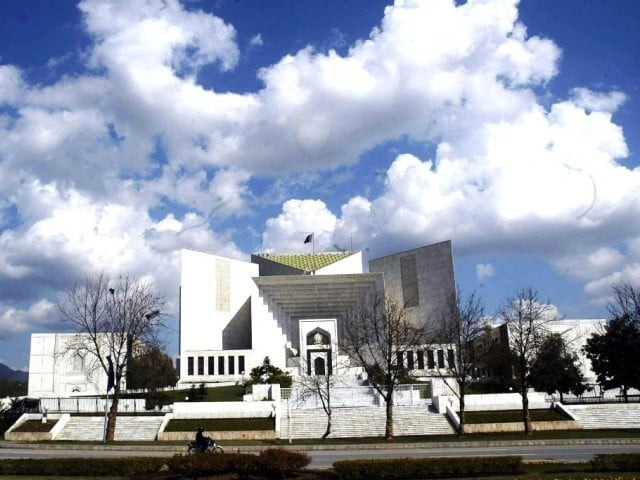Not against Constitution: SC says justice of peace powers within limits
Judges say special powers do not breach any basic rights.

Supreme Court. PHOTO: EXPRESS/FILE
The top court has ruled the powers granted to lower court judges for registering FIRs under Section 22-A(6) of the Criminal Procedure Code are not beyond constitutional limits.
The apex court announced on Monday that neither the functioning of ex-officio justice of peace encroached upon the judiciary’s independence nor did it work against the concept of its separation from the executive.
The Supreme Court’s five-judge bench, headed by Chief Justice Anwar Zaheer Jamali, had reserved its judgment on February 12 over three questions about the powers of the justices of peace.
The first question was whether or not Section 22-A of the CrPC was ultra vires of the Constitution as it conferred executive powers to a judicial officer. The second question was whether or not its alleged misuse worked against expeditious justice. The third questioned if the exercise of power under the section amounted to interference in the investigative domain of police.

The judgment states the powers of justices of peace do not infringe any of the fundamental rights guaranteed by the Constitution.
“It does not even remotely impinge upon the independence of judiciary nor does it militate against the concept of its separation from the executive. When the ex-officio justice of peace passes orders, issues directions or takes actions under the aegis of judiciary rather than the executive, he instead of going under the thumb of the executive, in fact, brings the executive under the thumb of law,” the ruling reads.
The judgment also holds that the functions performed by justices of peace being quasi-judicial in nature cannot be termed as executive, administrative or ministerial. Such functions being complementary to those of the police do not amount to interference in the investigative domain and thus cannot be held to be against the SC judgments.
The aggrieved persons who cannot afford the luxury of engaging a lawyer for filing a writ petition in a high court can seek an order or direction from the justice of peace without spending much. The judgment says transfer of investigation from one police officer to another is done only at the bidding of the well-off people.
In this state of despair, a legislation establishing equality before the law and breaking the idols of influence and affluence was desperately needed. The legislature rose to the occasion, enacted sub-section 6 of sections 22-A and 25 of the CrPC and enabled the poor to see eye to eye with those who infringed their rights with impunity in the past.
The order states the rationale behind conferment of such powers on justices of peace is to provide a remedy to an aggrieved person at his doorstep.
While endorsing the judgment, Justice Manzoor Ahmad Malik has authored an additional note, stating Justice of the Peace, before issuance of a direction on a complaint for the non-registration of a criminal case, must satisfy himself that sufficient material is available on record to show the aggrieved person has recourse to the high-ups in the police hierarchy.
Published in The Express Tribune, March 29th, 2016.



1724319076-0/Untitled-design-(5)1724319076-0-208x130.webp)















COMMENTS
Comments are moderated and generally will be posted if they are on-topic and not abusive.
For more information, please see our Comments FAQ